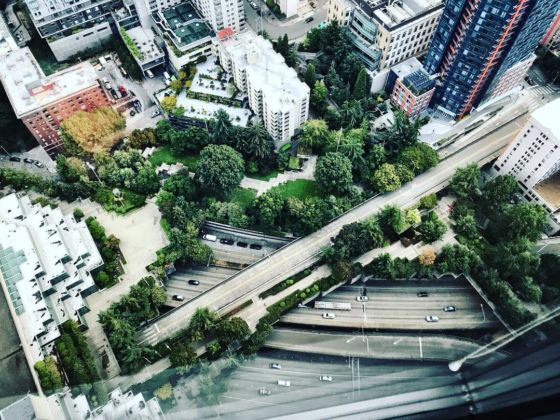There’s a new take on the “build up, not out” development concept in many of America’s biggest, and most densely populated, cities. The idea? Keep people outside. Several US cities including Dallas, Boston, and Chicago have installed public parks on top of busy highways, giving residents and visitors alike new space to breathe and transforming surrounding neighborhoods in the process.

These US Cities Are Covering Crowded Polluted Roadways With Gorgeous Parks
Depending on which city you’re in and who you talk to, these elevated green spaces are known as either deck parks or freeway cap parks. While they definitely improve the visual aesthetic (wouldn’t you rather look at a beautiful park than a backlogged highway?), they’re also adding much-needed green space into the hearts of congested cities. They may even help clean the air — the trees and plants sequester at least a small portion of carbon pollution emitted from the surrounding roadways.
In 2008, Boston re-developed its clogged Central Artery freeway area into an underground tunnel and capped it with the Rose Fitzgerald Kennedy Greenway, which stretches for a mile and a half. The Greenway is now so popular it even has its own Twitter account.
You’ve undoubtedly seen photos of St. Louis’ iconic Gateway Arch. The CityArchRiver2015 project redeveloped the surrounding area and created a one-block park on top of Interstate 70, easing access to the arch from central St. Louis.
Seattle’s aptly named Freeway Park re-joined the city split in two by Interstate 5. Residents now enjoy water features and green-draped sculptures that draw from the vibe of the Pacific Northwest. Above all, it muffles the annoyance of the city’s concrete splinter.
Dallas has also emerged as a prominent leader in the deck park movement; they opened the Klyde Warren Park in 2012, and currently have a second project in the works.
Additional deck park plans are in the works around the country, including a much-anticipated capping of the 101 Freeway in Los Angeles. A business coalition called Central Atlanta Progress is working on plans for a deck park over top of the 14-lane I-75 and I-85 corridor that runs through Georgia’s capital. The Stitch, as it’s been dubbed, would even include a new transit center. Denver plans to sink a part of Interstate 70 underground and cap it with open space, and Pittsburgh received a $19 million grant to cap the I-579 freeway. Minneapolis and Philadelphia aren’t far behind, and as the push to drive cities away from congested freeways grows, more cities are sure to follow suit.